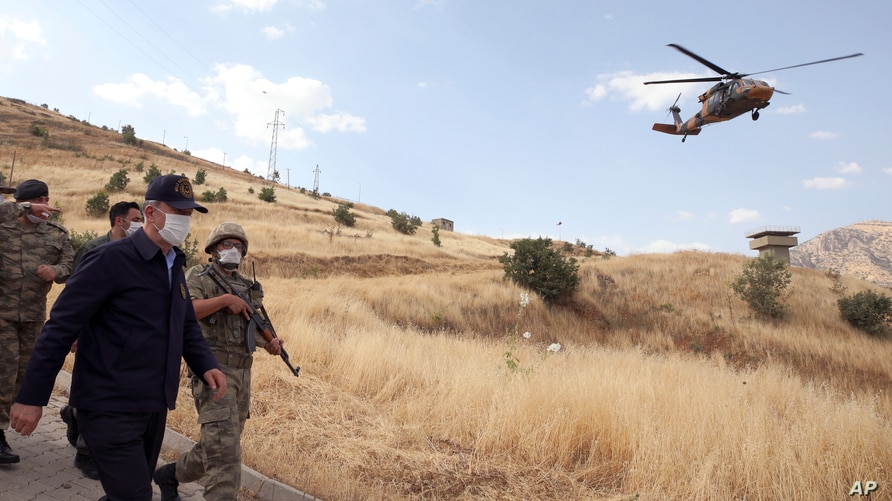Al-Monitor, April 30, 2021, Amberin Zaman, image: AP
Ankara has announced that Turkey will establish a military base in the mountainous area of Metina, near the Turkish border, in what critics consider a step toward controlling Iraqi Kurdistan.
Turkish Interior Minister Suleyman Soylu announced today that Turkey will establish a military base in Metina, a mountainous area close to the Turkish border in Iraqi Kurdistan, to surveil the broader region. Speaking to members of the ruling Justice and Development Party’s executive board, Soylu said, “Metina is an important region. Just as we did in Syria, we will build a base here and monitor the region. This area is a route to Qandil; we will control this route.”
Soylu was referring to the Qandil mountains on the Iraq-Iran border, where the main command center of the outlawed Kurdistan Workers Party (PKK) is based. He did not clarify his comparison with Syria, where Turkish troops occupy over 8,000 square miles in the north of the country, including Kurdish-majority Afrin, where the terrain is mostly flat. However, there, too, the Turkish presence is principally aimed at torpedoing PKK efforts to establish contiguity between the Kurdish-majority areas in the northeast with Afrin to the West.
A spokesman for the Kurdistan Regional Government had not responded to Al-Monitor’s request for comment as of time of publication.
Soylu’s statement came as Turkish special forces backed by F-16 fighter jets, helicopter gunships and drones kept up an offensive against PKK targets launched on April 23 in Metina and the neighboring Avashin and Basyan regions. Turkish President Recep Tayyip Erdogan said the offensive, dubbed “Operation Claw Lightning,” was designed to “completely end the presence of the terror threat … along our southern border.”
Turkey has carried out cross-border offensives of varying magnitude against the PKK for decades. However, in recent years, it’s begun to establish more of a sustained presence in a growing number of bases and checkpoints dotting the mountains of Iraqi Kurdistan. Arzu Yilmaz, a Middle East scholar and visiting fellow at Hamburg University, reckons that there are more than 5,000 Turkish forces currently deployed in Iraqi Kurdistan and in Bashiqa, an area under Iraqi central government control lying east of Mosul.
A PKK source speaking not for attribution acknowledged that the militants were under more pressure than ever before due to Turkey’s use of armed drones and that the PKK could no longer use regular roads and was forced use mountain trails to move around.
The PKK’s armed wing, known as the People’s Defense Forces, claimed it had not sustained any losses in the the latest offensive and that it had successfully repelled Turkish attempts to gain a foothold in Metina and Avashin. Turkey announced losing two soldiers in the fight today.
The Turkish calculus is to encircle and cut off access between the PKK’s principle hubs connecting Qandil to the Syrian border. Omer Ozkizilcik, an analyst at the SETA Foundation, a pro-government think tank in Ankara, called it a “a pre-emptive strategy” whereby Turkish forces are airdropped into the forbidding mountain ranges to prevent the PKK from establishing new footholds by creating their own.
In Metina, Ozkizilcik noted, Turkish forces have established a “network of checkpoints supported by drones and its air force.” A string of villages, however, separate Turkish forces in the southern part of Metina from those lying to north on the Turkish border. He suggested cooperation from the Kurdistan Regional Government would be required to establish a logistical supply line between the two that in turn would ease Turkish operations against PKK bases deeper inside Iraqi Kurdistan.
KRG leaders have said little recently of the wave of Turkish incursions, which have caused dozens of civilian deaths. Some 12 Turkish security officials held hostage by the PKK in a mountain cave were killed when a Feb. 11 Turkish rescue mission went spectacularly wrong. The Iraqi government frequently condemns Turkey’s operations but appears powerless to stop them.
Hisyar Ozsoy, a lawmaker for the pro-Kurdish Peoples’ Democratic Party, the third-largest group in the Turkish Parliament, reckons that the KRG is likely providing intelligence and logistic support to the ongoing offensive, “though I have no proof of that.” Ozsoy argued that Operation Claw Lightning was just the latest in a series of moves disguised as targeting the PKK when in fact “Turkey’s goal is to gradually occupy Iraqi Kurdistan.” The “next phase,” he predicted, would be yet another attack against the Syrian Kurds. “These attacks target the gains of the Kurds throughout the Middle East,” he said.
Iranian-backed militias believed to have carried out a recent rocket attack against Turkish forces in Bashiqa that killed one Turkish soldier have made it clear that any Turkish attempts to stray beyond KRG-controlled areas will be met with physical resistance. Sinjar, a Yazidi-dominated mountainous area bordering Syria where the PKK maintains a presence, and which Turkey keeps threatening to attack, is among the no-go areas.

